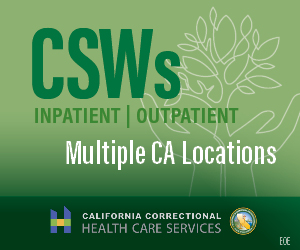|
E-Newsletter • August 2022 |
▼ ADVERTISEMENT

Editor's E-Note
In this month’s E-News Exclusive, learn about the effects of Proposition 47. Implemented in 2014, the law has had a far-reaching and significant effect on California’s criminal justice system.
Proposition 47 is just one of many efforts in the decarceration reform effort which has designs on making America’s penal system more just and fair.
We welcome your comments at SWTeditor@gvpub.com. Visit our website at www.SocialWorkToday.com, like our Facebook page, and follow us on Twitter.
— Lee DeOrio, editorial director |
|
|
|
|
▼ ADVERTISEMENT

From Felony to Misdemeanor: An Analysis of Decarceration
By Marisa Markowitz, LMSW, CASAC-T
Decarceration, loosely defined, is the removal of individuals from custodial supervision. The criminal justice system has a disparate web of prisons, jails, and mental health facilities that operate on local, state, and federal levels. When an individual is “decarcerated,” they are released from a legal operating entity that deems that the benefits of release outweigh the risk of diversion or recidivism.
There has been a decline in the number of individuals incarcerated in the United States. According to the Pew Research Center, there are approximately six million individuals incarcerated in adult correctional systems. The rate of incarceration decreased by 1% in 2019, and reached levels akin to 1996 in 2020. Despite a more recent increase in certain violent crimes, especially murder, violent and property crime rates have declined sharply in recent decades. Moreover, the Marshall Project found that over 100,000 were released from federal and state prisons due to the pandemic. To individuals unfamiliar with the criminal justice system, it’s important to unravel the benefits of release, the highlights of reparative services, and the voices that view decarceration as a threat to communal safety.
One of the benefits of release was a piece of legislation that pushed for a reduction in incarceration by classifying nonserious, nonviolent crimes as misdemeanors rather than felonies. Proposition 47, or “The Safe Neighborhoods and Schools Act,” was a referendum passed on November 5, 2014, by the state of California. Proposition 47 implemented three broad changes to felony sentencing laws. First, it reclassified certain theft and drug possession offenses from felonies to misdemeanors. Second, it authorized defendants currently serving sentences for felony offenses that would have qualified as misdemeanors under the proposition to petition courts for resentencing under the new misdemeanor provisions. Third, it authorized defendants who have completed their sentences for felony convictions that would have qualified as misdemeanors under the proposition to apply to reclassify those convictions to misdemeanors.
|
| Recently in Social Work Today |
The Heavy Toll of Serial Returning
It may seem harmless, but purchasing items only to take them back can signal underlying problems with self-esteem. Read more »
Guiding Incarcerated Women Toward Reentry
To avoid recidivism and to create opportunities for a fruitful life, appropriate services must be available on release. Read more »
▼ ADVERTISEMENT

|
Social Media Posts Criticize the 988 Suicide Hotline for Calling Police. Here’s What You Need to Know.
988 recently launched as an alternative to 911 for mental health emergencies, but concerns have been voiced about use of the service potentially resulting in police involvement and involuntary treatment, reports KHN.
Decriminalizing HIV: Scientifically Proven and Morally Correct
Countries that criminalize people with HIV have lower rates of treatment and viral suppression, suggesting that decriminalization efforts would more effectively halt the spread of the disease, according to STAT. |
AMAF Forms Consortium of Institutions to Address LGBTQ+ Health Disparities
The American Medical Association Foundation (AMAF) recently announced that several of Harvard Medical School’s (HMS) affiliated hospitals in collaboration with Fenway Health in Boston and Vanderbilt University Medical Center (VUMC) in Nashville will participate in the AMAF National LGBTQ+ Fellowship Program consortium of institutions. They join the pilot fellowship at Icahn School of Medicine at Mount Sinai in New York City and the 2021 inaugural institution at the University of Wisconsin School of Medicine and Public Health in Madison, Wisconsin.
Launched in 2020, the fellowship program aims to provide enhanced physician training, education, and cultural sensitivity while bringing awareness to the health care and institutional barriers faced by LGBTQ+ and intersecting communities. The program’s ultimate mission is to ensure that all LGBTQ+ patients receive the highest standards of care while helping transform the landscape of medical education. The addition of two exceptional teaching institutions to the program demonstrates the AMAF’s commitment to moving the needle and taking the fellowship to scale nationwide.
“The AMAF is uniquely positioned to serve as a convening force to improve LGBTQ+ health equity by facilitating collaboration and knowledge sharing between key stakeholders and institutional leaders that will transform health care systems to be LGBTQ+ inclusive and affirming,” says William Sternfeld, MD, president of the AMAF Board of Directors. “The result will be a workforce of LGBTQ+ health specialists with a rich body of knowledge that can be shared with all medical schools and health care professionals.”
|
Tower Behavioral Health Set to Open Eating Disorders Program
Tower Behavioral Health, one of eastern Pennsylvania’s premier mental health and addiction treatment centers, recently began offering acute inpatient treatment for eating disorders.
The program, which serves adolescents aged 14 to 17 and adults aged 18 and older, is the only inpatient eating disorder treatment option in the greater Delaware and Lehigh Valley region. When fully functional, the program will be able to accommodate 16 individuals.
The eating disorders program accepts patients who are medically or psychiatrically unstable and struggling with anorexia, bulimia, binge-eating disorder, or other related eating disorders. Average length of stay is 14 to 28 days.
|
|
|
COVER STORY
Connected Care
When integrated services function together with a focus on prevention and well-being, patients may experience less health-related disruptions in their lives and enjoy overall better physical and mental health. However, delivering such care is not easy.
FEATURE
Social Work’s Obligation to Undocumented Students
Social workers have a responsibility to ensure that undocumented students have access to the necessary resources to grow and thrive.
|
|
|
| Advertising Opportunities |
Have a product or service you want to market to social work professionals? Utilize the reach of Social Work Today Magazine to accomplish your marketing goals. Email our experienced account executives today at sales@gvpub.com or call 800-278-4400 for more information.
|
| © 2022 Social Work Today Magazine |
|
|